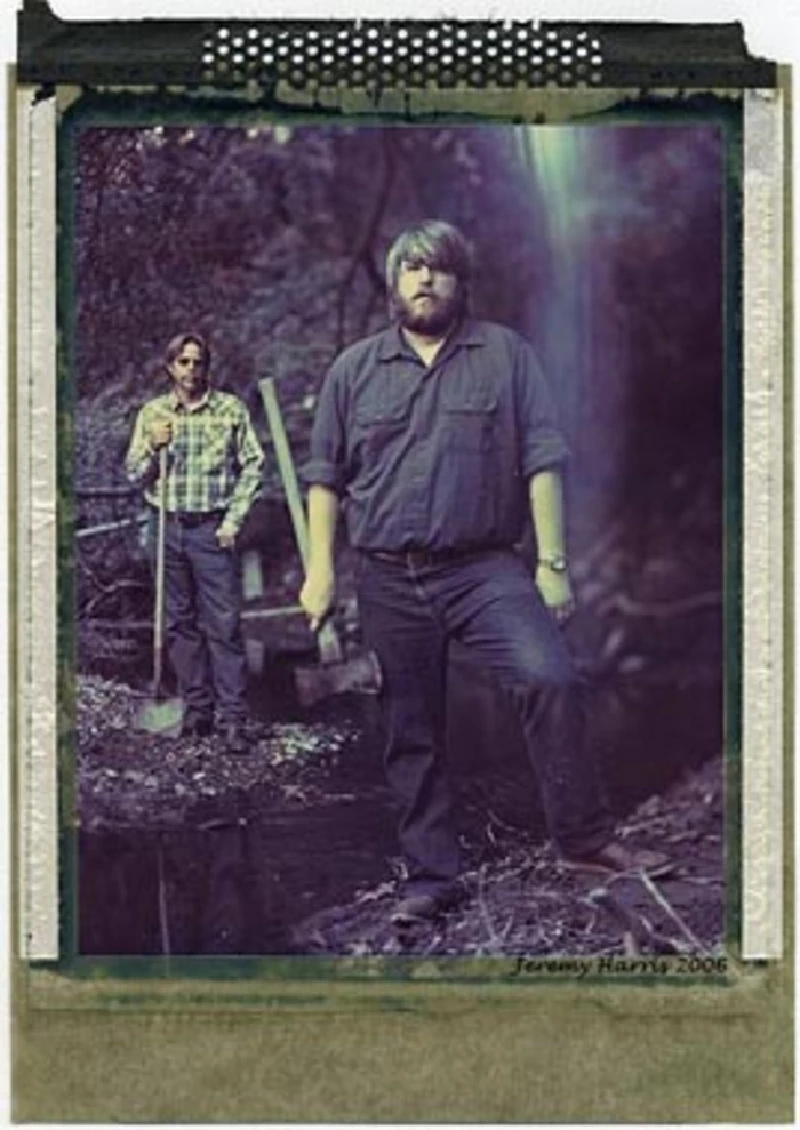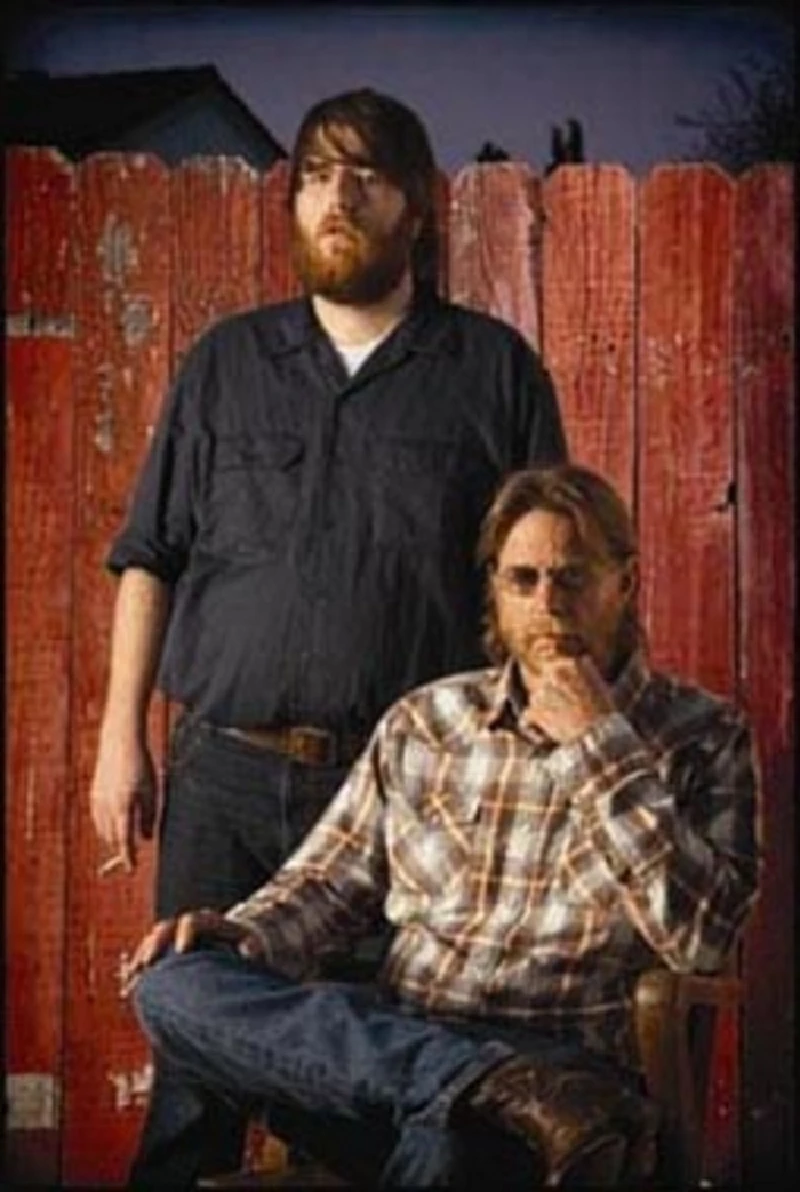Bob Frank and John Murry - Interview
by John Clarkson
published: 23 / 7 / 2007

intro
On their first British tour American duo Bob Frank and John Murry speak to John Clarkson about their debut album 'World Without End', which recalls ten true but largely forgotten tales of murder which took place between 1797 and 1961
Murder ballads generally come from one of two schools of thought. There is the traditional school, which takes its inspiration from folklore, and there is the modern school, inspired by the likes of Nick Cave, which puts its emphasis on theatre and Gothic humour. A collection of original murder ballads, Bob Frank and John Murry’s new album, ‘World Without End’, was recorded as a reaction to each of these two schools of thought and rejects both. Recalling ten true but largely forgotten tales of murder which took place between 1796 and 1961, Frank and Murry, who share the vocals, tell their stories as matter-of-fact journalism without exaggeration or moralizing and with an unflinching honesty and lack of compromise. When Pennyblackmusic meets them at a gig at Edinburgh’s Bongo Club on their first British tour playing support to Richmond Fontaine, Frank and Murry seem on the surface a somewhat unlikely pair of “best friends”. Frank at 62 is a laidback pipe-and-pot smoking grandfather of three, while Murry, the great grandson of the Nobel Prize winning author William Faulkner, is an intense and thoughtful 27 year old. Described by the producer Jim Dickinson (Green on Red, the Replacements, Screamin’ Jay Hawkins) as the “the greatest songwriter you never heard”, Bob Frank began his musical career shortly after he returned from Vietnam in 1972 by releasing a self-titled debut album on Vanguard Records. After falling out with Vanguard’s label boss Seymour Solomon at the album’s launch in New York, Frank was, however, abruptly dropped. He moved to California and quit music only finally beginning to record it again in 2002. He has since then gone on to make four solo albums, including ‘A Little Gest of Robin Hood’, a translation of a 15th century Robin Hood ballad set to his own music. “I spent most of time I was away from music just raising my family” Frank recalls when asked how he spent his thirty year absence from recording. “I did keep writing songs and some of them even ended up getting recorded, but by other people and not by me.” John Murry was born in Tupelo, Mississipi, but spent several years living in Memphis, Frank’s home town, where he played in various unrecorded bands before moving with his wife to California. Frank and Murry first met after a mutual friend in Memphis put them in touch. They played in a band together, Los Gueros, before embarking on 'World Without End’. “I had written songs for a long time” say Murry, describing his relationship with Frank. “But I had never released anything before Bob and I got together, because I had always thought my songs didn’t match up to what was expected of me. Some of it had to do with the Faulkner thing and some of it was because being a younger guy I thought that I couldn’t legitimately write. Then I met Bob and all that dissipated because we had such a strong and immediate musical connection.” Frank and Murry’s original intention was to record a collection of traditional murder ballads, but they quickly decided to abandon this idea to focus on a collection of original songs. “They had already been done” Frank recollects. “They were all old, so we decided to do new ones” “We wanted to avoid mimicking other people” Murry adds, describing the criteria he and Murry created for themselves as they wrote ‘World Without End’.“A lot of traditional murder ballads have really salvatory overtones and we wanted to cut that out. The other reality for me is that a lot of the stories are based on things in Scottish or Irish or English folklore and are not really very real. We wanted to tell true stories that really took place in the United States.” Frank and Murry’s suitably downbeat and mostly acoustic guitar arrangements underpin all the songs on ‘World Without End’. To these are added eerie-sounding instrumentation from an arsenal of other musicians which include the album’s producer, American Music Club member Tim Mooney, on drums ; Brian Hendrix on banjo : Pete Postlethwaite on bowed saw : Nate Cavalieri on piano and organ and David Manning on a 600 year old violin. Its stories, which are told sometimes from the perspective of the perpetators of the crimes and sometimes from that of the victims, are especially grisly. The oldest story on the album, ‘Madeline’, tells of a 16 year old servant girl who was seduced by the innkeeper who she worked for and whose wife after she had found them together had the girl murdered and her body bricked up in the tavern’s chimney, where it was not discovered until the 1930’s. The most recent tale, ‘Bubba Rose’, is about a dock worker who checked into work one day and for still unknown reasons shot his boss. The other stories on the album include those of ‘Liitle Wiley Harpe’, an early nineteenth century bandit who about to be hung for his crimes confessed that despite committing innumerable murders and infamously flaying many of his victims the only murder he regretted was the killing of a young infant for screaming ; “Kid Curry’, an outlaw and murderer who in 1904 trapped by lawmen turned his gun on himself with his last bullet rather than let them capture him, and ‘Joaquin Murietta’, an 1850’s Mexican immigrant who after seeing his wife and child murdered by a gang of white men joined an outlaw gang and went on a killing spree of white settlers before being eventually caught and having his head severed and placed in a jar of vinegar. Possibly most harrowing of all are ‘Jesse Washington’ and ‘Tupelo, Mississipi’, which tell of a savage racist lynching told from the point of the view of the agonized victim who is castrated and doused in petrol and a klansman who 20 years later remains totally unrepentant about the murder. “Some we found out about on the internet and some we found in history books and some we were told about” says Frank when asked where he and Murry discovered these murders “Some of the tales on the album I heard about when I growing up” recollects Murry. “But all of them, either the ones we were told about or the ones we learned about, we looked back and tried to figure out through newspaper clippings and things from the period what had actually happened.” “It was actually a real fun thing to do that” continues Frank. “That was why we really kept doing it. To me it was a fun thing to do, to research these things and to find these interesting stories and to think how we could tell them.” The album takes its inspiration from a statement on Frank and Murry’s website by William Faulkner-“The past is not even dead. In fact it is not even past…”-and draws modern parallels with current news events such as drive-by shootings, race and gang wars and the recent Virginia Massacre. The album suggests that we could all commit murder and also all be the victim of murder, and in its depiction of murder as it really is without glamour and horrific, as one critic has said, ’World Without End’ also serves as warning shot “to save us from ourselves’. With its tales of revenge, body desecration and torture, was there, however, ever a point when Frank and Murry thought that they might be going too far ? “Bob and I drove down to get a burger after we had written ‘Joaquin Murietta’” says Murry. “And there is a line in that. ‘They cut out all their tongues’ and Bob and I were both like ‘Is that too much ?’” “I was going to sing that line” Frank adds. “John had come up with that lyric about cutting out the tongues and I was thinking ‘This is a little bit over the top’ but when I came to sing it I was like ‘That’s perfect. It is supposed to be like that’. We were trying to make the songs on the album sound like newspaper accounts, and that really does that. It was supposed to be really graphic and strong. We were not trying to poeticize or humanize things at any level .” As both Frank and Murry have avoided the tendency of other murder ballads to moralize, their listeners are left to make up their own minds about the characters in the songs. While some such as the Klansman come across as simply despicable, others such as Kid Curry for sheer bravado alone and Joaquin Muiretta, sinned against as well as sinning, come across, despite both being multi-murderers. as more sympathetic. “It is human nature that your own perspective creeps into it” says Frank. “When you hear the songs you make judgments about them, but the words themselves aren’t in any way judgmental.” “We were like that too about some of the people in the songs” concludes Murry. ”In ‘Joaquin Murietta’ you feel very drawn to the plight of the Mexican goldminer and all that has been done to him. But by the same token we tried to present the things that he did as retaliation as real and as graphic also.” Bob Frank and John Murry will be returning to the UK for a second tour in late September and will playing support dates with both the Willard Grant Conspiracy and Chuck Prophet and the Mission Express and also some headline dates.
Picture Gallery:-

most viewed articles
current edition
Carl Ewens - David Bowie 1964 to 1982 On Track: Every Album, Every SongArmory Show - Interview with Richard Jobson
John McKay - Interview
Colin Blunstone - Thalia Hall, Chicago, 16/7/2025
Bathers - Photoscapes 1
Billie Eilish - O2 Arena, London, 10/7/2025
Loft - Interview
Visor Fest - Valencia, Spain, 26/9/2025...27/9/2025
Sir Tim Rice - Interview
Robert Forster - Interview
previous editions
Manic Street Preachers - (Gig of a Lifetime) Millennium Stadium, Cardiff, December 1999Heavenly - P.U.N.K. Girl EP
Beautiful South - Ten Songs That Made Me Love...
Peter Perrett - In Dreams Begin Responsibilities Interview Part One
Boomtown Rats - Ten Songs That Made Me Love....
Oasis - Oasis, Earl's Court, London, 1995
Coldplay - Wembley Arena. London, 16/8/2022
Prolapse - Interview
Trudie Myerscough-Harris - Interview
Pixies - Ten Songs That Made Me Love...
most viewed reviews
current edition
Davey Woodward - Mumbo in the JumboSick Man of Europe - The Sick Man of Europe
Lucy Spraggan - Other Sides of the Moon
Amy Macdonald - Is This What You've Been Waiting For?
Suzanne Vega - Flying With Angels
Blueboy - 2
Bush - I Beat Loneliness
Phew, Erika Kobayashi,, Dieter Moebius - Radium Girls
Alice Cooper - The Revenge of Alice Cooper
Cynthia Erivo - I Forgive You
Pennyblackmusic Regular Contributors
Adrian Janes
Amanda J. Window
Andrew Twambley
Anthony Dhanendran
Benjamin Howarth
Cila Warncke
Daniel Cressey
Darren Aston
Dastardly
Dave Goodwin
Denzil Watson
Dominic B. Simpson
Eoghan Lyng
Fiona Hutchings
Harry Sherriff
Helen Tipping
Jamie Rowland
John Clarkson
Julie Cruickshank
Kimberly Bright
Lisa Torem
Maarten Schiethart